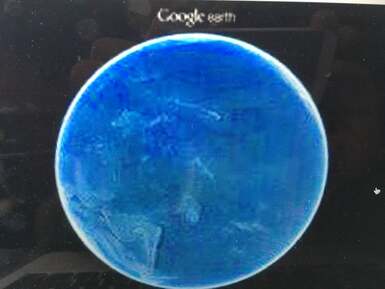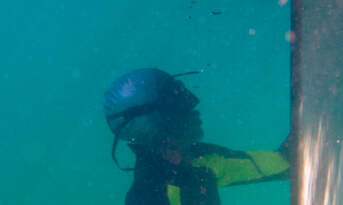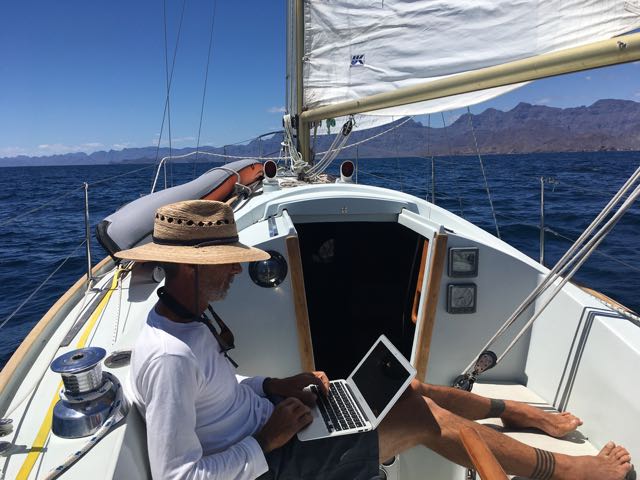 This photo is a Google earth image -- centered on the Pacific Ocean. It is about 12,000 miles across the middle there. Eight of the most remote places on Earth are out there -- islands -- places where we might stop for water and fresh food. A typical transit time in a boat like Eos -- which moves about five miles an hour -- would be about 8 months from Mexico / Panama on the right -- to Fiji or New Zealand over on the lower left. The trick is to leave around March and 'wander' your way West -- so you can end up in Fiji or some other safe haven for typhoon season.  So, when researching what we wanted to do and how we wanted to do it -- we looked to the habits, customs and practices of those who actually stayed out there for decades. How did they do it? What do they advise or recommend -- and why? Our original goal included a three-year stay in French Polynesia -- the boat remaining in the water for that entire time. Then another two years or so as we crossed the rest of the Pacific and headed back to South East Asia -- my home since the late 1990's. We read about people who planned such multi-year excursions and that sounded like fun. One of the lessons we learned and have tried to apply ever since doing that research is from Jacques Cousteau -- to stay out as long as you can -- which typically means -- how much does it cost? He lamented that in the later years of his career -- fundraising for expeditions took up more of his life that he liked So, finding the least expensive way to go out -- and stay out -- was a primary goal. He was also noted for making a distinction between adventurers and explorers -- which we have folded into our self-created job titles -- explorers in residence. An adventurer, Cousteau proposed, climbed a mountain or whatever for publicity, as a stunt or other attention grabbing reasons. Where an explorer carried with them the idea of going out -- and back -- and also sharing what was found. That is the cost of getting to see. You have to share what was found. Sounded perfect. Nature speaking for herself... My job is to observe. Yay! This is where the real fun of expedition preparation began. You look at that map -- and swallow really hard and maybe say "oh shit.." -- and then start to break life down into pieces. Finding out how much food, water and supplies we really needed. How to store and put it all away. How to be 100% autonomous for months at a time -- underway -- often weeks or longer away from anything or anyone. During the second half of the trip the islands will only be about one week apart -- so much easier than the first third of the trip that could be a month or longer. This is the part my wife joked was like living in a space ship. You have to disconnect from the land and open this new way of living called cruising or voyaging or whatever label you like -- disconnecting from land life. So, we discovered that the easiest way to prepare ourselves for this was -- to stop doing everything else. You have to. You can not pay attention to or appreciate what is going on around you -- out there -- and worry about your mortgage payment or other land concerns. Land and all her complications and concerns get put on hold when you leave. We have also discovered that people believe us to be living in a Corona beer commercial as our life...um no. This is Michael cleaning Eos. Holding my breath, by hand. In certain places, this might be as often as every 20 days or so. With zero equipment except a sharpened putty knife and a mask, I can do Eos in 3-4 hours -- holding my breath. That is because Eos is 32 feet long and takes one gallon to cover the 200 sq ft area underwater two times. In comparison, a 36 foot sister to Eos -- looking identical just four feet longer -- has a surface area underwater three (3) times larger. 36 ft boat 600 sq ft vs 32 ft boat 200 sq ft. That three times bigger area to clean in exchange for four extra feet. No thanks. By the way, that 36 footer costs the same as four (4) Eos. Extreme remote expedition planning makes you look at everything in life differently. What do I want to spend my time doing? How much equipment do I want / need to rely on based on how big of a boat we have? Can I fix all that stuff? And this was supposed to be fun to -- right? So, when speaking of expedition prep and an experiment we have been conducting on ourselves -- this is what we mean. There is only one way to sail away. Just leave. Your adventure does not begin at the airport you depart from -- it begins when you land in that new place and smell those new smells. Albert Einstein is noted for saying -- do not tie your life to people or things, tie your life to a goal. Our goal is to keep going and to find as many ways to share the hope we keep finding as we can. M
0 Comments
Leave a Reply. |
Michael Sylvester
|


 RSS Feed
RSS Feed